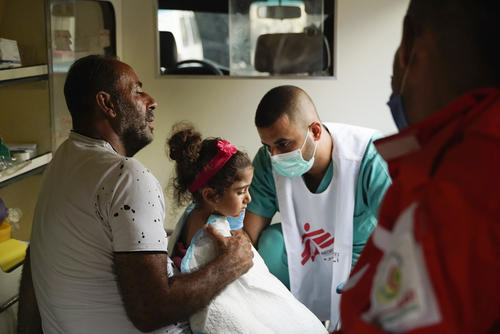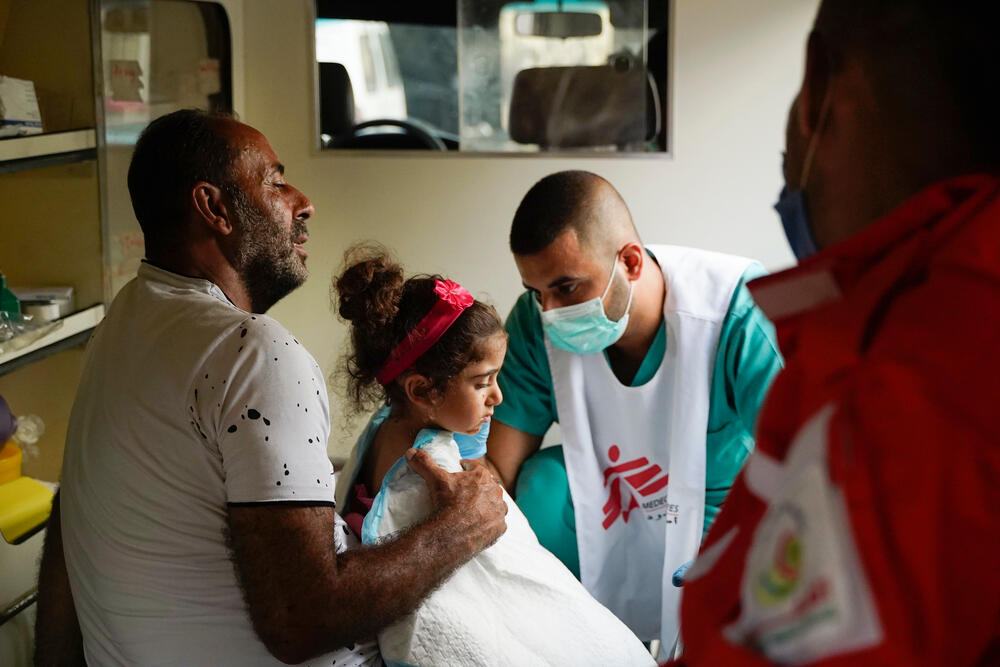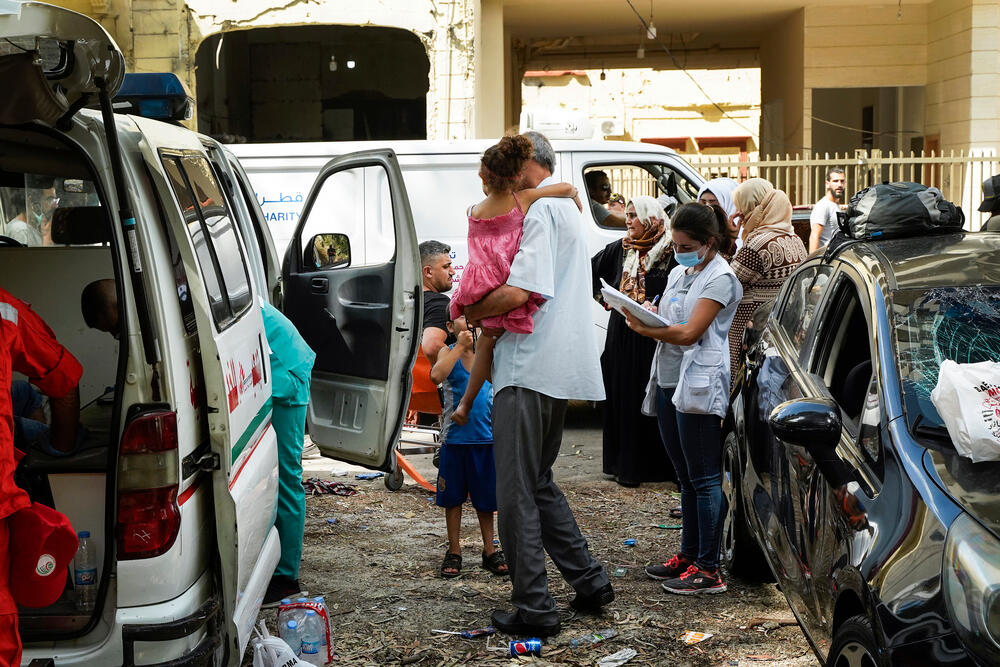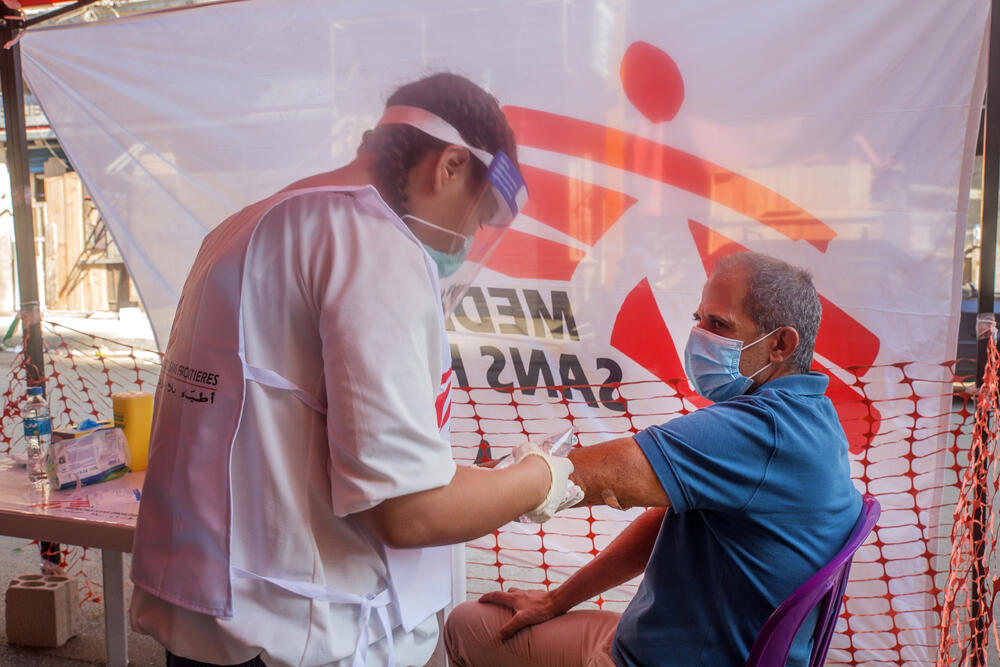Beirut explosion: MSF teams respond as COVID-19 cases surge
MSF has launched an emergency response to provide medical support to people affected by the devastating explosion that tore through Beirut on 4 August 2020. This comes as COVID-19 infections rise across the city in the chaotic aftermath of the blast.
Our emergency activities cover three main areas: wound care for people still suffering from injuries, continuity of care for patients with chronic diseases, and mental healthcare for people affected by the traumatic event.
"Yesterday, we were in a pandemic, we were just talking about the rising cases of COVID-19. And now, what?" MSF epidemiologist Krystel Moussally recalls the events of 4 August 2020 in Beirut #Lebanon pic.twitter.com/2m4pd30r5y
— MSF UK (@MSF_uk) August 10, 2020
We have set up two medical points in the neighbourhoods of Mar Mikhael and Karantina, the areas most affected by the explosion, while we have also begun door-to-door visits to understand people’s needs and to better provide them with assistance.
MSF teams have also installed water tanks and distributed water and hygiene kits to people coming to the medical points. This had been highlighted as an essential need by people surveyed in the neighbourhood.
Shockwaves and surges
The powerful explosion that happened a week ago ripped through Beirut’s port warehouses. It caused the deaths of more than 150 people and injured over 6,000.
The first response to the explosion came from the people themselves, who spontaneously tried to provide aid and support to those affected by the blast using whatever minimal resources they had available.
The blast generated seismic shockwaves that shook the ground, shattered windows and destroyed buildings across Beirut, a city already reeling from an economic crisis and a surge in COVID-19 infections.
"On the night of the explosion, there was a huge influx of patients into health facilities across the capital... which eventually led to this increase [in COVID-19 infections]"
“Before the explosion, the public system was struggling to handle the increasing number of COVID-19 cases,” says Julien Raickman, MSF’s country manager for Lebanon.
“Since then, there has been a very steep rise in reported COVID-19 cases in Lebanon, especially in Beirut. There have been more than 1,500 new cases in a week. This represents almost 25 percent of all cases reported in the country since the beginning of the pandemic.
“On the night of the explosion, there was a huge influx of patients into health facilities across the capital, and infection and prevention measures could not be implemented properly, which eventually led to this increase. Over 300,000 people lost their homes and have had to find other places to stay, which doesn’t make things any easier.
“This rise of cases is a major concern for us and we’re trying to see how to best adapt our projects under such circumstances.”
Psychological first aid
Another area of concern for MSF is mental health.
“After the civil war, economic crises and the recent financial and social hardships, this latest incident has added an extra layer of trauma for the people of Lebanon,” adds Raickman.
“Based on our experience, we know that this will have a tremendous impact on the psychological wellbeing of the people and will stay for years to come. That’s why a national mental health strategy needs to be put in place to manage the long-term psychological impacts of this crisis on the people of Lebanon.”
As mental health is a key pillar of MSF’s work the country, we were able to quickly mobilise a team of nine psychologists to take part in our emergency response. They provided psychological first aid and are now working towards developing a long-term response for people in need.
Maintaining medical supplies
Even before we began our emergency response, MSF donated first aid dressing kits and surgical masks to the Civil Defence and the Lebanese Red Cross on the night of the explosion and in the days that followed, to prevent the spread of COVID-19 and respond to the explosion.
Since then, MSF has been working on providing additional medical supplies to support those tending to the high number of injured.
“The role of these groups and of local organisations has been crucial, especially in this first week following the explosion,” concludes Raickman.
“We’re trying to adapt our projects based on existing activities that have already been implemented by civil society groups, because they are clearly the leading force in this collective response to the events.”

Medical care where it's needed most
MSF in Lebanon
MSF began working in Lebanon in 1976 in response to the civil war, sending medical teams to the south of the country and to Beirut. This was MSF’s first mission in a warzone.
Today, MSF provides free medical care in various locations with over 600 staff members in Lebanon.


